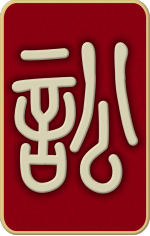
讼 Sòng Contention (Conflict) [hexagram 6]


Heaven over Water
 Metal element
Metal element
Lunar month: 3 ; Host (controlling) line : 5
The Decision
Even though sincere in argument, expect opposition. Proceed carefully and there will be good fortune. Stubbornly argue to the end and there will be misfortune. Favorable to imitate the hero; a great journey is not beneficial.
Strength above perilous water – contention. ‘Even though sincere in argument, expect opposition. Proceed carefully and there will be good fortune’ – there is strength in the center. ‘Stubbornly argue to the end and there will be misfortune’ – contention should come to an end. ‘Favorable to imitate the hero’ – honor the middle and the true. ‘A great journey is not beneficial’ – leading to a deep pit.
有孚, 窒. 惕中吉. 终凶. 利见大人, 不利涉大川. Sòng: yǒu fú, zhì. tì zhōng jí. zhōng xiōng. lì jiàn dà ren, bù lì shè dà chuān.
彖传: 讼, 上刚下险, 险而健讼. 讼有孚窒, 惕中吉, 刚来而得中也. 终凶; 讼不可成也. 利见大人; 尚中正也. 不利涉大川; 入于渊也. Tuàn zhuàn: Sòng, shǎng gāng xià xiǎn, xiǎn ér jiànsòng. sòng yǒu fú zhì, tì zhōng jí, gāng lái ér dé zhòng yě. Zhōng xiōng; sòng bù kě chéng yě. Lì jiàn dà ren; shàng zhōng zhèng yě. bù lì shè dà chuān; rù yú yuān yě.
The Image
Sky and water contend in movement. It is wise to plan first steps with care.
象传: 天与水违行, 讼; 君子以作事谋始. Xiàng zhuàn: Tiān yú shuǐ wéi háng, sòng; jūn zǐ yǐ zuò shì móu shǐ.
Line Change 1
Not persevering with contention. Only a few wounding words yet all will be well.
‘Not persevering with contention’ – the dispute should not be protracted. ‘Only a few wounding words yet all will be well’ – the contention is clearly set out.
初六: 不永所事, 小有言, 终吉. Chū liù: bù yǒng suǒ shì, xiǎo yǒu yán, zhōng jí.
象传: 不永所事, 讼不可长也. 虽有小言, 其辩明也. Xiàng zhuàn: Bù yǒng suǒ shì, sòng bù kě cháng yě. Suī yǒu xiǎo yán, qí biàn míng yě.
Line Change 2
Losing the argument. Go to ground with local community to escape trouble.
‘Losing the argument’ – withdraw and remain concealed, to contend with superiors only brings calamity.
九二: 不克讼, 归而逋, 其邑人三百户, 无眚. Jiǔ èr: bù kè sòng, guī ér bū, qí yì rén sān bǎi hù, wú shěng.
象传: 不克讼, 归而逋也. 自下讼上, 患至掇也. Xiàng zhuàn: Bù kè sòng, guī ér bū yě. Zì xià sòng shǎng, huàn zhì duō yě.
Line Change 3
Gaining strength from ancient virtue to remain resolute. Risky but ends well. Serving the great deserves no reward.
‘Gaining strength from ancient virtue’ – following those above will be fortunate.
六三: 食旧德, 贞厉, 终吉, 或从王事, 无成. Liù sān: shí jiù dé, zhēn lì, zhōng jí, huò cóng wáng shì, wú chéng.
象传: 食旧德, 从上吉也. Xiàng zhuàn: Shí jiù dé, cóng shǎng jí yě.
Line Change 4
Losing the argument. Turn back and study the bigger picture. Changing mind brings peaceful resolution. All will be well.
‘Losing the argument. Turn back and study the bigger picture. Change mind brings peaceful resolution’ – this is not a failure.
九四: 不克讼, 复即命渝, 安贞吉. Jiǔ sì: bù kè sòng, fù jí mìng yú, ān zhēn jí.
象传: 复即命, 渝安贞; 不失也. Xiàng zhuàn: Fù jí mìng, yú ān zhēn; bù shī yě.
Line Change 5
Winning the argument. Great good fortune.
‘Winning the argument’ – the correct balanced place.
九五: 讼元吉. Jiǔ wǔ: sòng yuán jí.
象传: 讼元吉, 以中正也. Xiàng zhuàn: Sòng yuán jí, yǐ zhōng zhèng yě.
Line Change 6
An honor bestowed but three times snatched away in one morning.
To be honored for contention is not the foundation of virtue.
上九: 或锡之鞶带, 终朝三褫之. Shǎng jiǔ: huò xī zhī pán dài, zhōng cháo sān chǐ zhī.
象传: 以讼受服, 亦不足敬也. Xiàng zhuàn: Yǐ sòng shòu fú, yì bù zú jìng yě.
The full set of 64 English translations is available in our new book 'Book of Changes - Deciphered' ➚.